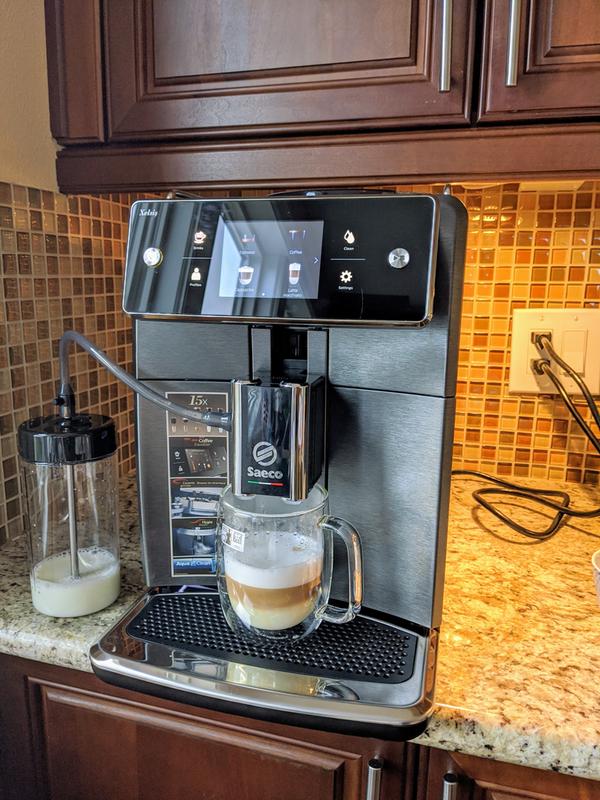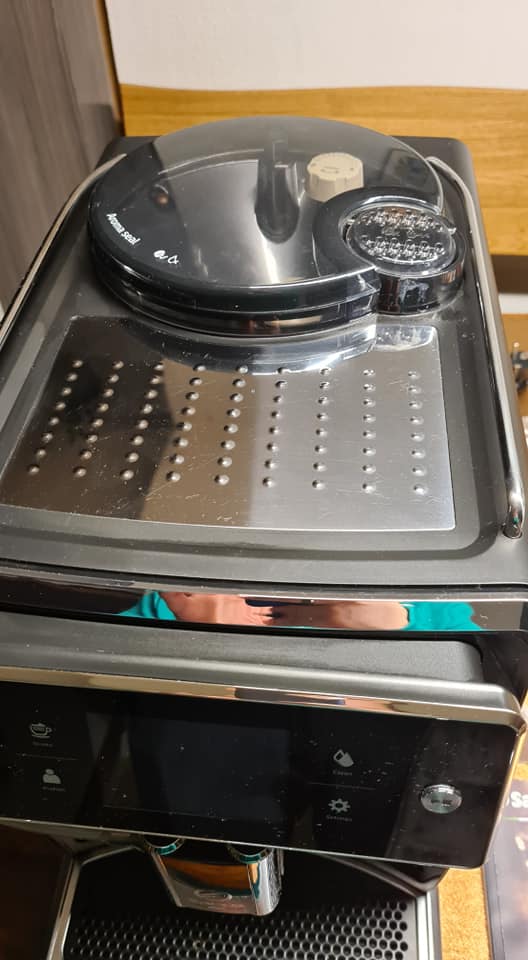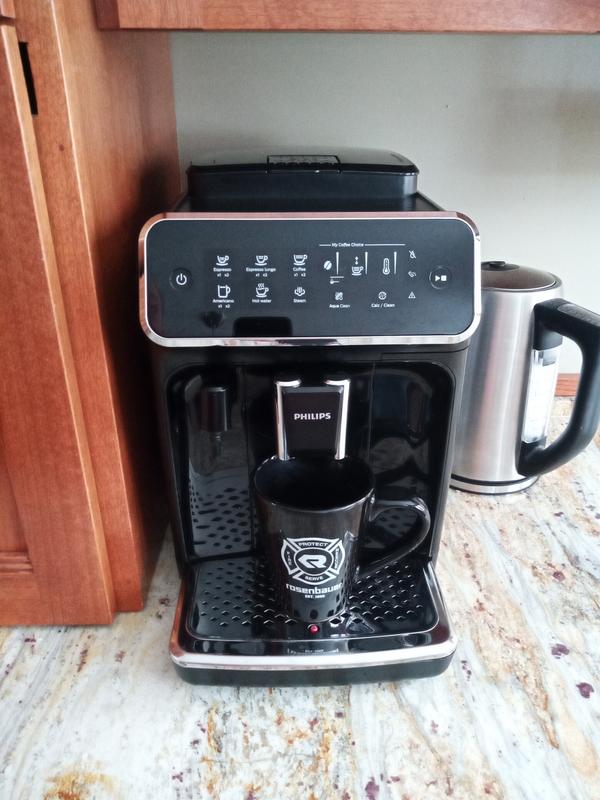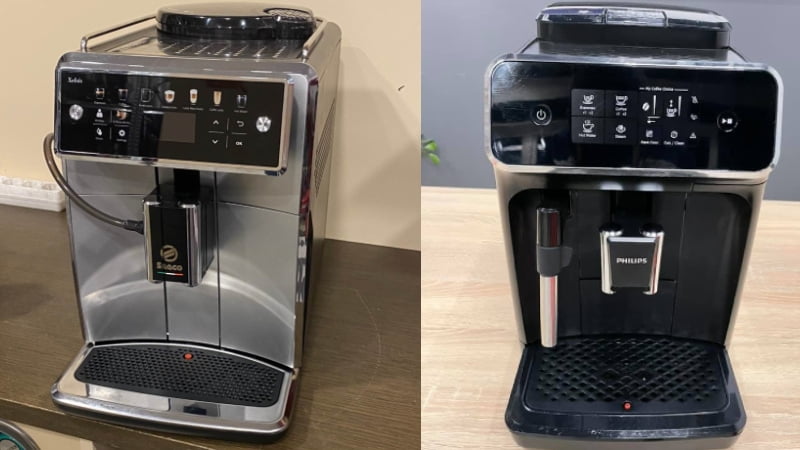After 2 months of daily brewing, I have decided the winner between Saeco Xelsis vs Philips 3200. For me, Philips 3200 is the winner and is the better value-for-price product.
Philips 3200 is one of the most stable models I have ever tested. Its espresso quality is consistently nutty, robust, and aromatic. I also like its favorable cleaning cycles. On top of that, the milk system can handle microfoam as well. With all these features and a small price tag, this model is suitable for beginners and experienced users.
As for Saeco Xelsis, this machine is not bad at all. In fact, I quite like its espresso and milk quality. However, the brewing time is not very efficient t=since it takes forever to dose and tamp. And, I’m not fond of the shallow drip tray either. I will elaborate further below.
Saeco Xelsis vs Philips 3200: Specs & Features Comparison Chart




Last update on 2025-04-13 / Affiliate links / Images from Amazon Product Advertising API
Saeco Xelsis vs Philips 3200: Differences
Philips 3200 wins 3 – 1 against Saeco Xelsis, all thanks to its delicious espresso, stable and quiet grinder, elaborate cleaning cycles, among other features that I find very attractive for an espresso machine in such a good price range. I will tell you how these espresso makers have worked for me during the 2 months of testing.
Coffee flavor: Tie
+Grinder
Let’s get to know Philips 3200 and Saeco Xelsis’ grinders first. Philips 3200 is equipped with a ceramic conical burr grinder, while Saeco Xelsis comes with a flat ceramic burr grinder. Each type has pros and cons to them.
With Philips 3200, I get a very stable and quiet grinder with 12 settings for various ground textures. The results have been smooth and even, and I don’t see much leftover in the grinder either. In the long run, ceramic and conical is a wonderful combination of designs since it avoids jams and leftover coffee ground in the grinder.
With Saeco Xelsis, the grinder has been working equally smoothly. The ground results are even, and the operation is silent. I’m satisfied with the overall operation so far. However, I wouldn’t say that the “flat” design is an ideal grinder shape since the shape is more prone to jams and leftovers, resulting in breakage or hectic cleaning sessions.
Material-wise, ceramic is a wonderful pick for a coffee grinder since it doesn’t heat the coffee beans or coffee ground too much, affecting espressos’ taste. With ceramic grinders, the quality of the beans remains unchanged.
Nowadays, most espresso makers use ceramic for their grinders. What you need to keep in mind is that ceramic is more fragile than steel. There is no doubt about that. But, if you keep the grinder from suffering external impacts, you can get delicious espressos for years.

+Dosing + tamping
Philips 3200 easily wins this round because, even though both devices dose and tamp automatically, Saeco Xelsis takes a much longer time to dose and tamp. With Philips 3200, I pick the drink when the water is ready, and it takes 25-30 seconds for the espresso to start dispensing.
On the contrary, Saeco Xelsis takes me roughly 40-45 seconds for a single espresso to start dispensing. It’s indeed only a few seconds more, and a few seconds don’t sound too bad. But it can get tiresome when you stand next to the machine and wait for it to start extracting when you are in a hurry.
This is not a major minus point for Xelsis since 45 seconds aren’t much. I just want to throw the info out there so you can compare and consider all aspects.
+Heating system
Philips 3200 and Saeco Xelsis use a single boiler to brew their drinks in terms of heating systems. There is a catch here.
Saeco Xelsis does a better job at making hot espressos. The drinks come out steaming, and I take time to sip them to avoid burning my tongue. With Philips 3200, the temperature is definitely for enjoying right away without being scadled, but it’s not too cool either.
Overall, I prefer the temperature performance of Saeco Xelsis because I prefer hot drinks that take time to enjoy.
Milk System: Philips 3200
Philips 3200 and Saeco Xelsis can froth quality milk foam. I can guarantee that. Dry and airy foam is their specialty. While Philips 3200 directs towards manual control with its steam wand, Saeco Xelsis offers a convenient automatic carafe.
Why do I pick Philips 3200 as the winner in this particular round? Because, as I have mentioned, it offers more control. I can decide more freely if I want a creamy layer of foam or a drier one with the steam wand. The process is more organic, and I get to play around with the texture.
With Saeco Xelsis, users also have access to the flexible milk texture option, but there are only 4 levels of foam, which range from no foam to dry foam, so there are definitely fewer options.
Utilities: Saeco Xelsis

Saeco Xelsis wins thanks to its one-touch milk-based beverages like cappuccino, latte, flat white, etc., and its 6 user profiles. This means that 6 different users can save the drinks they like and the settings they have applied to each recipe without affecting other users and vice versa.
If you are a beginner, I still highly recommend Saeco Xelsis because, despite having minor aspects that aren’t as stable as those of 3200, this machine is still straightforward to manage.
Cleaning & Maintain: Philips 3200
It’s easy to clean Philips 3200 and Saeco Xelsis since they have many integrated cleaning processes that can execute automatically. From rinsing the milk system to the entire brew path, both machines have unique cycles for each purpose.
But, Philips 3200 wins the round because it has various warnings on the interface that tells us when to clean, and its drip tray is well designed. On the interface, you will find multiple alerts about descaling or rinsing, depending on the state of the machine itself.
Saeco Xelsis also has a good cleaning system, but its drip tray has left a wrong impression. If you dump the tray frequently on a daily basis, it won’t be a problem. But, if you wait until the end of the day after many brewing sessions, the tray will appear small, narrow, and ineffective. So cleaning the tray constantly (if you brew many times per day) is crucial.
Design & Material: Philips 3200
This is 100% subjective, but I prefer Philips 3200 since it looks much better on my kitchen stand than Saeco Philips. Don’t get me wrong, both espresso machines have a sleek and modern look to them, but Saeco Xelsis’s dark silver color looks pretty dull and makes the corner dimmed.
Material-wise, even though Philips is made mainly of plastic while Saeco Xelsis is made almost entirely of titanium, the Xelsis has a flimsier feel to it. At the same time, 3200 appears to be much sturdier.
Have you seen photos of Philips 3200 and Saeco Xelsis? What do you think?

Saeco Xelsis vs Philips 3200: Similarities
There are 2 similar features that Philips 3200 and Saeco Xelsis share that I want to highlight. Both greatly affect the convenience of daily use, so you won’t want to miss it.
Instructions on how to proceed with a cleaning cycle
Whenever I start a cleaning cycle, like quick rinsing or descaling, Philips 3200 and Saeco Xelsis will show the instructions on the screen to guide me through. They tell me where to pour the cleaning solution, which buttons to press, or how long I should wait before doing the next step.
I think this is a highly convenient feature, given that not many users are familiar with maintaining espresso machines. The same goes for me. Even though I’m an ex-barista, brewing drinks has always been more accessible than cleaning the devices. A bit of instruction will keep us from asking for help from Google.
Frontal water tank for easy access
There are various water placement designs that I have seen in models from all price ranges, and frontal access is one of the finest designs:
- It saves extra backspace.
- We don’t have to move the machine around to remove the tank.
- It’s easier and more convenient to refill frequently.
Quick Rundown of Philips 3200
- With Philips 3200 Series easily make up to 5 black and milk-based coffee varieties at the touch of a button! Enjoy the delicious taste and aroma of coffee from fresh beans at the perfect temperature
- Classic Milk Frother System: Dispenses steam, allowing you to easily prepare silky smooth milk froth for your cappuccino
- Intuitive Touch Display: Select the perfect coffee for your mood with just one touch
- My Coffee Choice Menu: Adjust the strength and quantity of your beverage and choose from three different settings to suit your preferences. The Aroma Extract system intelligently strikes the optimum balance between brewing temperature and aroma extraction
- Powerful Filter and Easy Maintenance: Thanks to the AquaClean, enjoy clear and purified water - by changing the filter after being prompted by the machine, you will not need to descale your machine for up to 5000 cups
Last update on 2025-04-13 / Affiliate links / Images from Amazon Product Advertising API
Quick Rundown of Saeco Xelsis
- With Philips Saeco Xelsis easily make up to 15 coffee varieties from common Espresso and Capuccino to specialty coffees like Flat White or Americano. Simply swipe the touchscreen to select the drink and customize it with our intuitive Coffee Equalizer.Filter type:Reusable.Power consumption stand-by : 0.5W, Drip tray capacity : 500 ml
- 15 Coffee Varieties at Your Fingertips: Explore the world of coffee - Espresso, cappuccino, macchiato, and a range of specialty drinks
- Personalized Preferences: Everyone’s custom coffee favorites can be saved in up to 6 user profiles for instant selection. Personalize each profile down to the finest detail
- LatteDuo Milk System: Prepare and enjoy single or double serving of any coffee recipe with one touch, including Cappuccino or Latte Macchiato
- Double Thermo Blocks: Dedicated for both brewing and steaming offer accurate temperature controls for every drink in your recipe book
Last update on 2025-04-13 / Affiliate links / Images from Amazon Product Advertising API
Product Videos
Related Articles to Philips 3200
- Philips 3200 Vs Breville Barista Pro: Which Machine Brews More Exquisite Espressos, Has Better Automation And Is Easier To Clean?
- Philips 3200 Vs 3100: Reviewing 2 Super-Automatic Espresso Machines After 2 Months Of Using
- Philips 3200 Vs 5000: Which Espresso Machine Brews More Delicious Drinks And Has Better Utilities?
- Philips 3200 Vs 5400: A Head-To-Head Comparison
- Jura D6 Vs Philips 3200: Which One Is Better?
- Jura E8 vs Philips 3200: Tough Choice To Find The Better
- Jura E6 Vs Philips 3200: A Head-To-Head Comparison
- Jura A1 Vs Philips 3200: Reviewing 2 Affordable And Super-Automatic Espresso Machines. 1 Is Much Better
- Breville Barista Express vs Philips 3200: Which Automatic Coffee Maker Is A Better Fit?
Related Articles to Saeco Xelsis
- Saeco Xelsis Vs Philips 5400: Which One Is Better?
- Jura J6 Vs Saeco Xelsis: Does The Price Decides A Potent Espresso Machine? Honest Review After 4 Months Of Using
- Jura E6 Vs Saeco Xelsis: Reviewing 2 Super-Automatic Espresso Machines For Home Use
- Jura Z6 Vs Saeco Xelsis: Which Espresso Machine Serves More Delicious Beverages For Larger Crowds?
- Jura Z8 Vs Saeco Xelsis: My Complete And Honest Review On 2 Expensive Super-Automatic Espresso Machines
- Saeco Xelsis Vs Jura Ena 8: Which Model Brews Better Espressos And Coffees?
- Saeco Xelsis Vs Jura E8: Which High-End Model Is More Intuitive And Brews Better Coffee?
- Gaggia Accademia vs Saeco Xelsis: Evaluating 4 Key Differences For Home Coffee Drinkers & Espresso Lovers
- Gaggia Babila vs Saeco Xelsis: Which Is The Easiest Super-Automatic Espresso Machine To Use With A Built-In Grinder?
- Saeco Xelsis Vs Gaggia Cadorna Prestige: Which One To Choose?
- Delonghi Eletta Vs Saeco Xelsis: Which One Is Better?
- Saeco Xelsis vs Jura S8: 9 Differences That Help You Decide Between The Two Automatic Espresso Machines
- Breville Oracle Touch Vs Saeco Xelsis: Which One Is Better?
References:
- Philips 3200: https://www.usa.philips.com/c-p/EP3221_44/series-3200-fully-automatic-espresso-machines
- Saeco Xelsis: https://www.usa.philips.com/c-p/SM7684_04/xelsis-super-automatic-espresso-machine

Felix Hendricks is a skilled barista with over 12 years of experience. He excels in crafting coffee and has a strong foundation in coffee machine mechanics. Felix holds a Coffee Machine Maintenance Certification from the Coffee Equipment Technical Institute, showcasing his ability to diagnose and repair coffee machines. He’s also worked as a quality control specialist, selecting premium coffee beans for optimal flavor. Felix has a diverse work history, including stints at renowned coffee spots like Café Euphoria & Starbucks. His expertise in both brewing and machine maintenance makes him a respected figure in the coffee industry.
